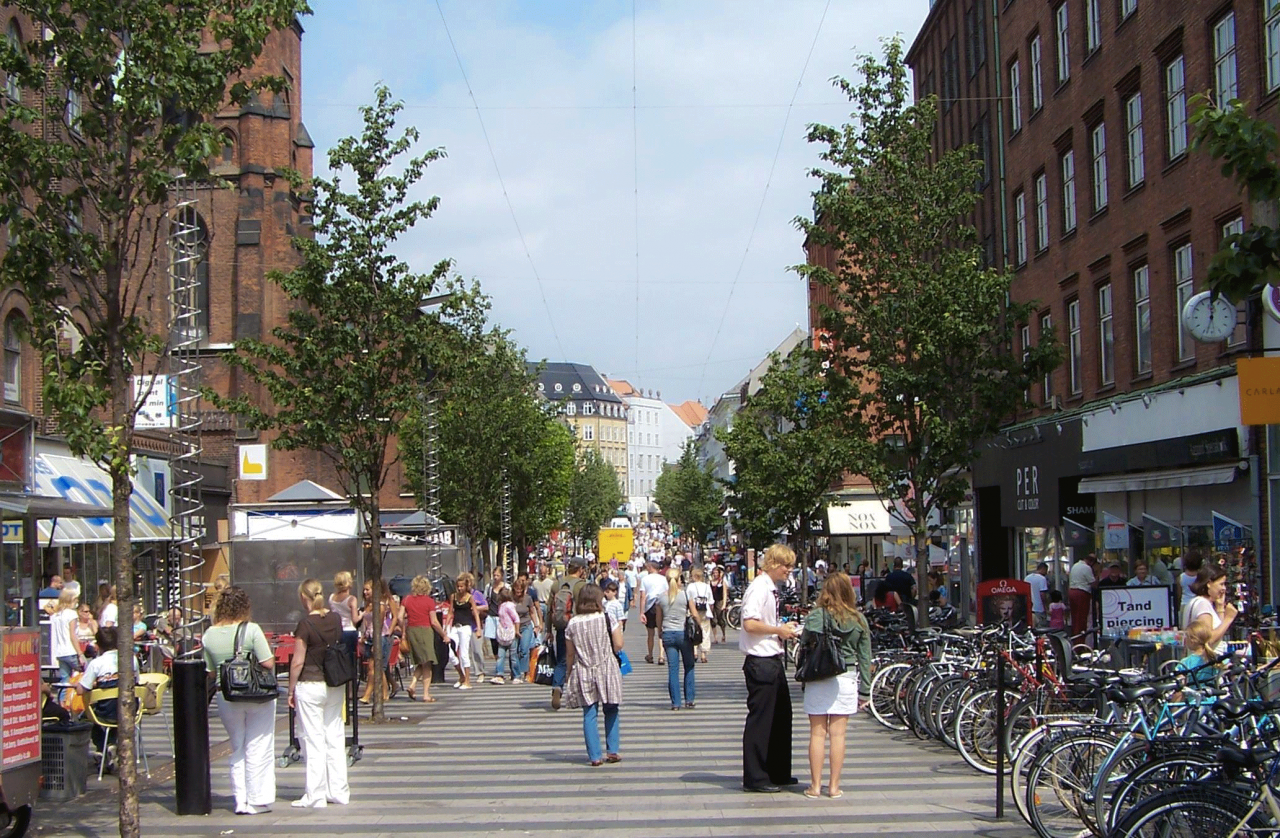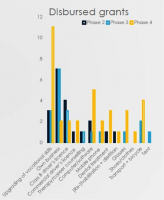
We can improve public services for local communities and individuals by giving them more control rather than imposing top down governmental programmes on them. This belief has led to a boom in “participative budgets” witnessed across Europe (and the world), as one of the easiest tools putting rights in the hands of communities. However, there has been less attention on the individual level, i.e., personal budget schemes that could activate citizens to make a change in their lives. URBACT CHANGE! partner city Aarhus (DK) was recently awarded the URBACT Good Practice Call label for its pioneering personal budget scheme tackling long-term unemployment. This article gives an overview of this innovative set of policy tools and suggests we might pay more attention to them.
Anne Mette, a graphic designer living in Aarhus, had been out of the job market for a lengthy period, mainly caring for her three young kids and chronically ill husband. Looking to return to work, she found herself in an extremely challenging situation when the local Jobcentre asked her the following question: what could she do with a personal grant of ca. €6725 if she could decide how to spend it in order to get a job. She hesitated but finally took the opportunity. Anne launched a micro-business with the grant. Now she produces hand-made, leather aprons for local restaurants with a great and increasing success. This is still not a big business, but a huge first step for Anne Mette.
Sharing responsibility leads to stronger citizenship
When you are unemployed, “you actually start thinking to yourself that you indeed cannot do anything to change your situation” – Anne Mette says in the short film published on the CHANGE! website by Aarhus. What Aarhus is experimenting now within its “Long-term unemployed take the lead” initiative is to share the responsibility related to public services between the public and the personal level. Participative budgets, already a well-known policy tool at community level seem to be working on a personal level too. So what are the benefits and the potential risks when a city authority intends to revolutionise its governance by sharing responsibility with citizens?
Understanding the power of responsibility sharing by local leaders was one of the main milestones when Porto Alegre in Brazil launched the world’s first participative or as sometimes called citizen budget in 1989. Today we are witnessing the expansion of this tool worldwide. In the URBACT CHANGE! network for example, Gdańsk (PL) and Amarante (PT) have experience on how to capitalise on the vibrant and growing power of direct involvement of people and communities. How to share decision-making, how to enable communities to work with budget holders to define local priorities, identify available resources and allocate these resources accordingly is a key learning point both for the respective councils and local people (see the CHANGE! Baseline Study or the case study on Gdańsk and Amarante).
So what are the benefits of participatory budgeting? Why do hundreds of European cities allocate resources for such initiatives? The story starts with the individuals involved: they feel themselves empowered, listened to and engaged, even if the money allocated for participatory budgets is very small in comparison with the city’s overall budget. More importantly, participatory budgeting can increase the connectedness of those involved, and such a tool also improves the understanding of public services within the local community. In addition, practitioners and leaders feel supported and understood and all of this generates greater trust and community cohesion, even if budget decisions are not specifically linked to local neighbourhoods.
But we also know that there are several challenges regarding participatory budgets, mainly linked to their sustainability. Maintaining the increased, but rather sensitive trust generated by such an action requires strong commitment, especially from political leaders. Participatory budgets are not just an interesting “toy” to offer for the public before elections. It is indeed a challenge not only to maintain the volume of the first initiative in terms of the territories covered, budget and interest, but to increase the potential impact in all senses. Experience shows that it is often hard to maintain the atmosphere of this new engagement – and it is always easy to lose them.
Long-term unemployed take the lead

The Danish city of Aarhus, in cooperation with the Velux Foundation, has been running this ground-breaking social experiment since the beginning of 2016 in the city. Jobcentre Aarhus hosts this pilot in which long-term unemployed persons over 30 years of age who have been on cash benefits for at least one year can prepare their own budgets to finance initiatives aimed at finding employment for them (support is up to DKK 50,000 per participant, ca. €6725€). The pilot involves 100 participants in two years and gets high attention both from national institutions and the press due to its innovative character.
The participants can apply for money for everything ranging from acquiring a driver’s licence and upgrading courses to new suits or electric bicycles. Funds may be disbursed to the project participants for any given purpose as long as the individual participants can account for how this will bring them closer to employment. The vision is that the individual becomes the driving force in their own job performance and that this will increase their chances of getting a job.
Although final assessment is not available yet, based on interviews (Status Report by City of Aarhus) made in January 2017 with a total of 34 participants, some initial, but promising messages can be derived. Initial results show that 14 out of 27 applicants who took part in phases 2 and 3 are no longer on unemployment benefits. In addition, based on the interviews most participants felt:
- That someone has confidence in them
- A renewed faith in their ability to find a job
- A boost to their personal and vocational self-confidence
- That the job consultant can finally provide them with assistance that they can use
Participants feel that the project differs from the usual programmes by:
- Being tailored to meet their specific needs
- Being built on trust from the job consultant, rather than control
- Being based on the participant’s own initiative and responsibility
- Resulting in marked personal ownership of the process.
Personalising social care
Before launching its initiative Aarhus has analysed some examples in England, where “there is agreement across the social care sector that personalisation, through personal budgets, is the right way forward and that well-implemented, personalised services benefit users and result in better outcomes. England is leading the world in personalising social care but this means that we are breaking new ground” (Personal budgets in social care, Second Report of Session 2016-2017).
In England, personal budgets in social care are sums of money allocated by a local authority to service users to be spent on services to meet their care needs. They can be managed on behalf of users by the authority, or a third party, or given to users as direct payments: money to spend themselves. They enable users to have more choice and control over the services they receive, tailoring their care to their personal circumstances and the outcomes they want to achieve. “When implemented well, personal budgets allow adults to try new ways to meet their social care needs, give them more choice and control over the care they receive and give them the opportunity to achieve the outcomes they want from their care” – states the above report. However, using personal budgets for employment is a relatively new topic in England too. According to the results of the first initiatives regarding employment, where personal budgets for employment support have been experimented with, they can and do work. “We therefore feel it should be the priority to ensure employment support can be accessed through adult social care personal budgets”- recommends the above report.
There are also lots of criticism and risks around implementing personal budget schemes. The most obvious challenge is that more vulnerable users, and those who lack mental capacity, will find it more difficult to take control of their care. They are less likely to be able to make good decisions on their own about how best to meet their care needs. Only a complex system can differentiate such a service to maximise benefits to users. In addition to this, yet in more advanced countries like the UK, the government has not gathered enough evidence yet on what are the best ways to personalise care services to maximise the benefits to users. This is why the above UK report recommends for the central government to set up a robust system to monitor personal budget schemes.
Another core question, which should be answered by the evaluation of Aarhus’ experiment is how to differentiate the system related to the barriers different people face when applying for personalised care. Aarhus’ experiment started on the way that the job consultants themselves selected the most potential participants for self-budgeting, while participants in latter phases were randomly selected through registration numbers on the basis of some predefined criteria. This process resulted in an increase in the number of citizens who declined the offer to participate in that scheme. This is a crucial point here. As some people face more barriers to utilising such a personalised scheme, Aarhus’ experiment and all other similar systems should also evaluate who might be more likely to benefit such an innovative tool.
Aarhus’s experiment also tackled this issue through an organisational method. The pilot offered two different courses for participants: a collective- and an individual one. In the collective courses participants meet with other applicants and thus they can learn from other’s experiences with self-budgeting. In the individual courses participants meet one-on-one with their case manager. The results so far indicate that peer support might have a crucial role: participants strongly prefer collective courses where they can get inspiration from peers, as some find it challenging to figure out what they want to spend the money on. They feel more comfortable discussing ideas with fellow unemployed citizens than with case managers.
The role of cities regarding changing care systems
Local authorities’ role within the public service delivery varies country by country and legislation is set at national or regional level. It seems that cities have a less important role in managing the change required within service delivery. Although it is not yet clear how local authorities can implement personal budgets in different countries, we do hope that in the future more and more municipalities, as the closest level of the public sphere to local communities will come up with solutions targeting public service reform. Also from URBACT cities...

“Creating a united society takes a united effort. In order to maintain and develop a robust social and economic welfare society, politicians, citizens, businesses, associations and municipal employees must rethink how we work together”. This is set by Aarhus in its ‘Active Citizenship Policy’, a general policy framework created in 2016. Following this mind-set and carefully going further with participatory budgets is thus recommended for all municipalities: keep the momentum and improve the existing participative budgets with the involvement of strong community institutions for neighbourhood governance (e.g. neighbourhood councils, installing local innovation brokers) and set up other incentives such as community dividends! Following the first successful steps to share responsibilities with the communities, it is also recommended to experiment the power of responsibility sharing through personal budgets, even though this seems to be a more risky and complex tool!
Welfare 2.0
Last, but not least it is worth mentioning the bigger picture. Personal budget schemes are a great example to test and demonstrate how an ideal public service provision should work. “Welfare State products used to be good solutions for the previous, rather predictable life paths, but, in nowadays’ globalised world, they are simply not good enough anymore and they are also becoming more and more expensive” - said Jeroen Hoenderkamp, strategic advisor of the city of Eindhoven, where a pioneer model, the WeEindhoven is being tested. Due to austerity measures local authorities across Europe must save money in times when demand for social care rises. The most effective response resulting in ‘doing more for less’ is often called as Relational or Preventive Welfare.
Existing top-down services too often reproduce social inequalities, create dependency and cannot efficiently tackle new problems (ageing societies, constant labour market disparities, migration, the scale of inequality, etc). In addition to this, existing services are poor at preventing social problems, and better equipped for reacting to emergencies, which is very expensive. A growing amount of evidence shows that top-down service delivery is too often a rather expensive way of maintaining the status-quo of those disadvantaged families who lack basic skills and are thus not able to break out of the vicious circle of support claiming.
“We are in the middle of a fundamental transformation of the welfare state. We are breaking with the classical conception of welfare as a standard benefit or service, and we are breaking with the time when a case manager could offer a standard product to all citizens. In these years the municipalities are making experiments with new forms of welfare – co-created with citizens and businesses.” – said Anne Eg Jensen from Aarhus in her article about the above personal budget initiative.
At the moment we can witness different experiments on very different scale in Europe. Whatever will be the outcomes of these initiatives, and whatever will be recommended by the first evidence, at the moment it seems that effective services are those that are local, that help people help themselves and focus on people’ capabilities instead of their needs. Personal budgets are pioneering examples of this change.

